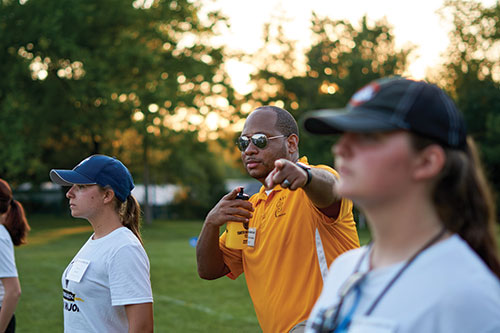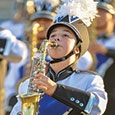
The resumption of fall activities presents challenges and opportunities for those who teach and adjudicate the marching arts. This hit home for me recently when I judged the Maine All-State virtual jazz and solo and ensemble festivals.
Many schools have had no in-person music classes this year. Others have had truncated student contact and socially distanced outdoor rehearsals. The groups that prepared recordings for the festival crammed six months’ of rehearsal work into a month. A few groups rehearsed virtually and made the recording that way. One group rehearsed virtually, and the only time they were in the same room was for the recording. The results were remarkable.
I thought about the upcoming fall season as I evaluated these performances. The need for empathy was strong, but also the need for honest, accurate assessments. I constantly put myself in the shoes of the director. What will we be hearing, seeing, and teaching in the fall? In many cases, programs of less complexity. The groups that I heard played literature of more modest difficulty out of necessity. A test of great teaching is great programming. Directors who pay attention to this area will produce results that judges can praise and reward.
Ensemble skills may be very rusty, especially early in the season. Judges should note this, but be sure to search for moments when the ensemble’s potential peeks through. Staffs need to redouble their commitment to the basics. The temptation to take shortcuts will be great. Both judges and staffs need to be patient with this part of the process. This is a great opportunity for a reset for the relationship between adjudicators and staffs.
After suspending the 2020 season DCI faced dilemmas in how to approach programming. The results indicate that many groups wanted to reestablish a strong audience connection. Phantom Regiment and Cadets programmed greatest-hits material from previous years for DCI’s truncated, non-competitive season. The initial reaction was very positive. This audience-friendly approach extended to others. Blue Knights programmed music of Louis Armstrong, and Boston Crusaders planned music by Perez Prado and Billy May. Rosemont Cavaliers announced a show with a simple message — roses, riffing off the group’s physical location and including La Vie En Rose and Sing, Sing, Sing. Under normal circumstances, these groups would never have performed literature of this sort.
A season without competition encouraged several groups to put concern for audience involvement first. This is encouraging. The world will certainly not be worse for having Rainbow Connection on the field. This may be an opportunity for a creative reboot
Drum corps has for some time grappled with a balance between esoteric and populist. Because of the groups that succeeded in competition, the pendulum had swung solidly esoteric, at the expense of audience engagement. Michael Cesario tried to reverse that trend when he was DCI’s artistic director and made a great deal of progress. Lessons learned post-Covid may accelerate that trend. Applause can be addictive. The question all marching arts organizations must ask is, "Do pandemic-weary audiences want heady programs or are they simply looking to be entertained?" History can offer a useful guide – whether it be the Depression-era escapism of Busby Berkeley’s films or the swing dancing craze that swept the nation at that same time. (The latter makes Cavaliers’ choice of Sing, Sing, Sing prescient.) How this translates to venues like Bands of America, where message shows have been predominant recently, will be fascinating to watch.
Many teachers have had horrendous schedules and had to develop educational strategies and curricula on the fly. Their work to keep music alive has been heroic. The same applies to the students. This is the opportunity to revel in this work. Teachers and students will be eager for feedback. One suspects all involved will be ecstatic to have band back. Adjudicators probably can’t wait to judge again, and performers and staff long to thrill audiences again. This is a fresh start, a new and promising day.
All concerned should be prepared for a rebuild, as some programs could have significant attrition. When continuity in music programs is broken, it is tough to recover the lost year of music development. There may be smaller groups and lesser skills on display for now. Some bands may be very young, but this fall marching band season can be a celebration of triumph over adversity. What a great lesson for our students!






